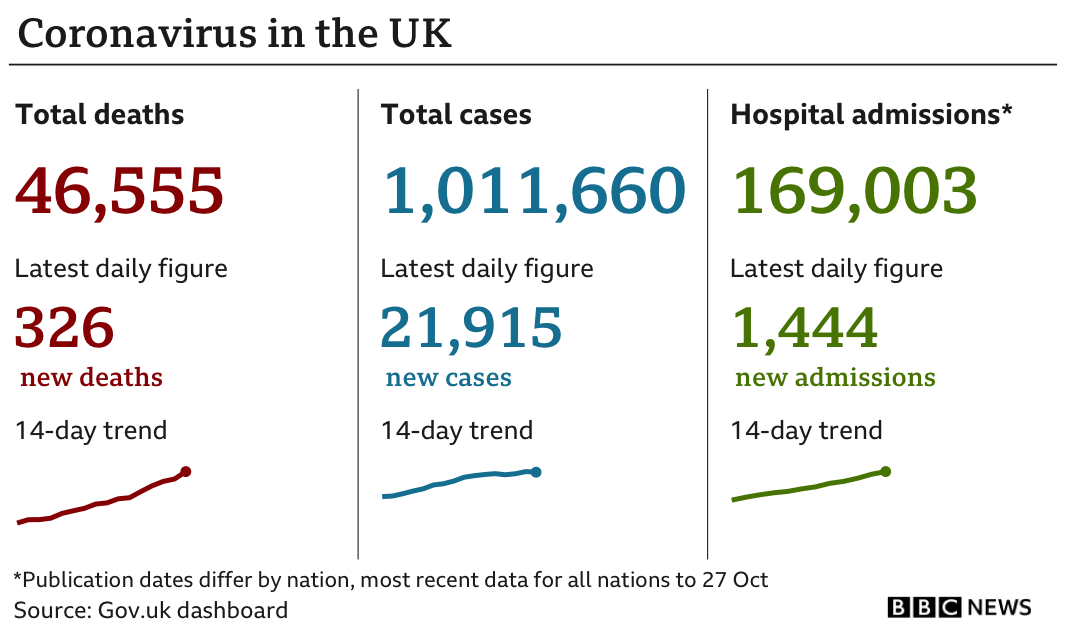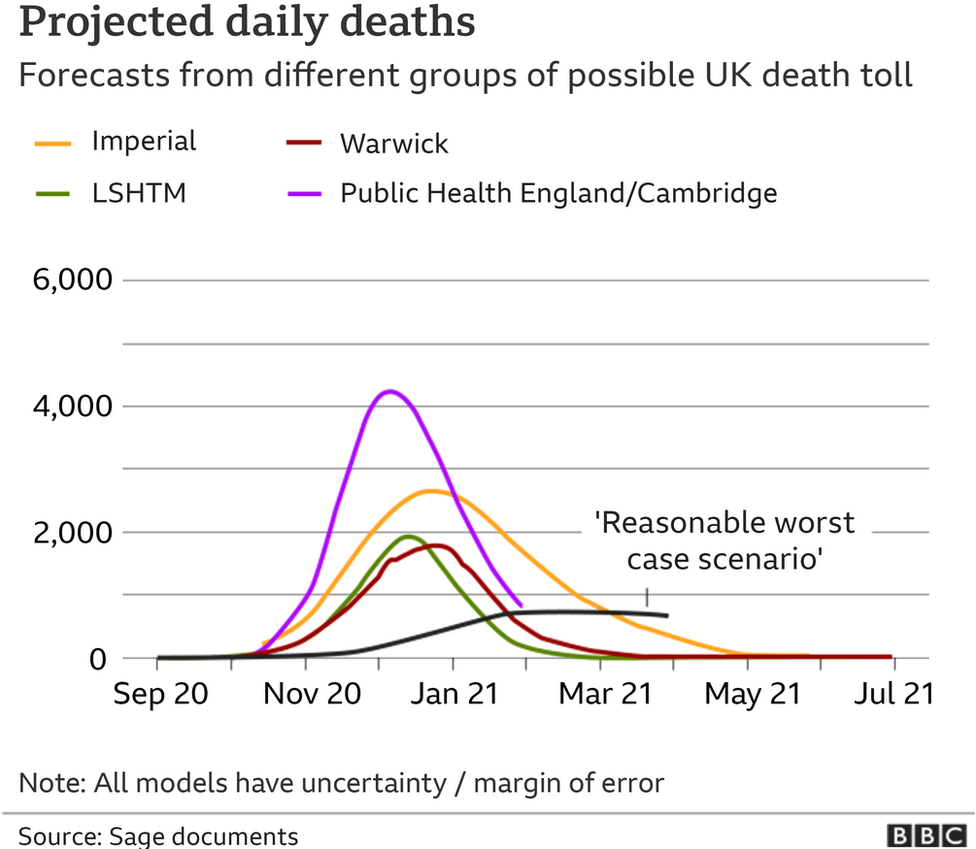Covid-19: UK lockdown may last beyond 2 Dec, says Gove
- Get link
- X
- Other Apps
"We do need to get the R rate below 1," the Cabinet Office minister told the BBC's Andrew Marr Show.
The strict measures are due to come into force from Thursday.
Pubs, restaurants, gyms, non-essential shops and places of worship will close, but schools, colleges and universities can stay open.
The prime minister is expected to deliver a statement in the Commons on Monday ahead of a vote on the latest restrictions on Wednesday. Labour has indicated it will back the lockdown.
Boris Johnson said he expects the lockdown to last until 2 December, after which England's regional tiered system would be reintroduced.
But Mr Gove told the programme that decisions would "obviously be guided by the facts".
He said ministers believe "on the basis of the evidence that we have that we will be able to [lift restrictions]" by 2 December, but stressed that "we do need to get the R rate [the number of people that one infected person will infect] below 1".
Mr Gove added that "we do need to be vigilant" and said "the reason why you need to take these steps is because of the danger of the NHS being overwhelmed".
Earlier, he told Sky News the lockdown could be extended beyond the December deadline.
Labour leader Sir Keir Starmer told the BBC there would "be no effective exit on 2 December unless the government uses this time to fix test, trace and isolate".
He has called for the lockdown to stay in place until the infection rate is below 1.

Under the new restrictions:
- People will be told to stay at home except for specific reasons
- These include work which cannot be done from home, childcare or education, exercise outdoors, medical reasons, essential shopping, providing care for vulnerable people or for volunteering, and visiting members of your support bubble
- Meeting indoors or in private gardens will not be allowed, but individuals can meet one other person from another household outside in a public place
- Non-essential retail will close, but can remain open for click-and-collect delivery
- Pubs, bars, restaurants will have to close, but can still provide takeaway and delivery, excluding takeaway of alcohol
- Indoor and outdoor leisure facilities, such as gyms and swimming pools, will also close, along with entertainment venues and personal care facilities such as beauty salons
- Places of worship will close, unless they are being used for funerals, to broadcast acts of worship, individual prayer, formal childcare, or essential services such as blood donation or food banks
- Construction sites and manufacturing workplaces can remain open
- Weddings and civil partnership ceremonies will not be able to take place except in exceptional circumstances, and funerals will be limited to a maximum of 30 people
- Children will still be able to move between homes if their parents are separated
- Clinically vulnerable people will be asked to be "especially careful" but people will not be asked to resume shielding
- Overnight stays, staying in a second home, and holidays will not be allowed - including in the UK and abroad - although there are exceptions, such as work trips
- People will be told to avoid all non-essential travel by private or public transport

Asked whether the government would face a choice of either closing schools and ending the lockdown earlier or extending the lockdown in order to keep schools open, Mr Gove said ministers "want to keep schools open".
He added: "I don't believe it would be that case, but I do believe that we want to keep schools open and I believe that the measures that we are putting in place will enable us to do so."
In the Sunday Telegraph, former Conservative leader Sir Iain Duncan Smith accused the prime minister of "giving in to the scientific advisers".
Sir Iain said the Scientific Advisory Group for Emergencies (Sage) had "pressurised" the government into taking this decision, with its members "publicly lecturing" the government.
Meanwhile, the chief executive of the British Retail Consortium, Helen Dickinson, and the chief executive of the New West End Company, Jace Tyrrell, described the lockdown as a "nightmare before Christmas".
There has been some support for the government's decision to extend the furlough scheme, covering 80% of employee wages, until December - hours before it was due to end.
Dame Carolyn Fairbairn, Confederation of British Industry director general, said extending furlough was a "vital step", adding that affordable mass testing would be the "game-changer" for businesses.
She said: "For many businesses, a second national lockdown marks the start of a bleak midwinter."

However, Mayor of Liverpool Joe Anderson said it was "interesting" the scheme had now been extended.
"That's the point about contempt... that they dismissed the [north of England's] call for the furlough scheme to be introduced in tier three but now have all of a sudden found the 80% furlough scheme for a tier four or national lockdown," he said.
Elsewhere, travel firms have warned of a "complete shutdown" across the industry when England goes into lockdown again and have called for the government to support the sector.
And England's Catholic Church strongly criticised the government for banning communal worship in the new lockdown.
The president and vice-president of the Catholic Church's Bishops' Conference - Cardinal Vincent Nichols and Archbishop Malcolm McMahon - said the latest restrictions would bring "hardship, distress and suffering" and called on the government to explain its reasons for the ban.
Meanwhile, teaching unions in England said that schools urgently need new safety measures, such as moving to a rota system and smaller class sizes.
Prof Neil Ferguson, whose modelling was crucial to the decision to impose the first lockdown, said keeping universities and schools open meant infections would decrease more slowly this time.


The UK is not the only country that has seen the progress of the disease go the wrong way, with France and Germany acting in recent days.
But it is also true that Boris Johnson cannot say for a second that he was not warned.
More than six weeks ago, not just the opposition, but some of Mr Johnson's own ministers, and some of his own advisers were pushing for another limited lockdown to try to slow the spread of the disease.
Conversations were active in government by the third week in September about the possibility of taking national action as the second wave was developing, potentially in a more serious way than the scale of the pandemic in the spring.

The prime minister told a Downing Street news conference on Saturday that the measures were to prevent a "medical and moral disaster" for the NHS.
He warned that Christmas may be "very different" but said he hoped taking action now would mean families can gather.


The UK recorded another 21,915 confirmed coronavirus cases on Saturday, bringing the total since the pandemic began to 1,011,660.
Another 326 people were reported to have died within 28 days of a positive test.
The UK is the ninth country to reach the milestone of a million confirmed cases - after the US, India, Brazil, Russia, France, Spain, Argentina and Colombia.
Almost 11,000 people are now in hospital with Covid-19, including 978 on ventilators.
A presentation by the government's pandemic modelling group SPI-M shown to the PM and seen by the BBC included one forecast which suggested deaths could reach more than 4,000 a day if no action was taken.

- SOCIAL DISTANCING: What are the rules now?
- SUPPORT BUBBLES: What are they and who can be in yours?
- FACE MASKS: When do I need to wear one?
- SCHOOLS: What will happen if children catch coronavirus?
- TESTING: What tests are available?

Elsewhere in the UK, Wales' First Minister Mark Drakeford said the 17-day "firebreak" there will end as planned on 9 November.
He said that his cabinet will meet on Sunday to "discuss any potential border issues for Wales in light of any announcement by No 10".
Scotland's First Minister Nicola Sturgeon has issued new advice that people should not travel to or from England, except for essential purposes, ahead of the nation's five-level system of restrictions coming into force on Monday.
- Get link
- X
- Other Apps



